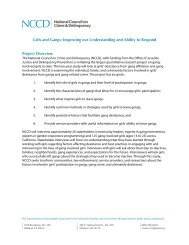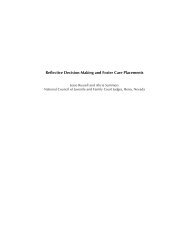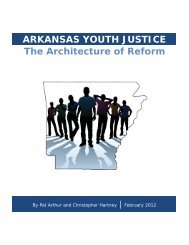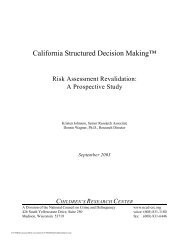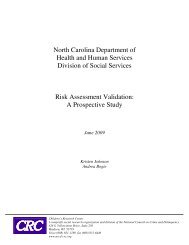Evaluation of the Insight Prison Project - National Council on Crime ...
Evaluation of the Insight Prison Project - National Council on Crime ...
Evaluation of the Insight Prison Project - National Council on Crime ...
You also want an ePaper? Increase the reach of your titles
YUMPU automatically turns print PDFs into web optimized ePapers that Google loves.
Introducti<strong>on</strong><br />
Founded in 1997, <str<strong>on</strong>g>the</str<strong>on</strong>g> California-based <str<strong>on</strong>g>Insight</str<strong>on</strong>g><br />
<str<strong>on</strong>g>Pris<strong>on</strong></str<strong>on</strong>g> <str<strong>on</strong>g>Project</str<strong>on</strong>g> (IPP) is a n<strong>on</strong>pr<str<strong>on</strong>g>of</str<strong>on</strong>g>it communitybased<br />
organizati<strong>on</strong> committed to <str<strong>on</strong>g>the</str<strong>on</strong>g> design and<br />
implementati<strong>on</strong> <str<strong>on</strong>g>of</str<strong>on</strong>g> rehabilitative programs tested<br />
within San Quentin State <str<strong>on</strong>g>Pris<strong>on</strong></str<strong>on</strong>g>. San Quentin is<br />
California’s oldest and best-known correcti<strong>on</strong>al<br />
instituti<strong>on</strong>. The pris<strong>on</strong> today includes life-sentenced<br />
and detriment-sentenced adult males. As <str<strong>on</strong>g>of</str<strong>on</strong>g> December<br />
2011, <str<strong>on</strong>g>the</str<strong>on</strong>g> populati<strong>on</strong> was approximately 4,400<br />
inmates. The state’s <strong>on</strong>ly executi<strong>on</strong> chamber and death<br />
row for all c<strong>on</strong>demned male inmates are located at<br />
San Quentin.<br />
IPP programs are designed for incarcerated<br />
populati<strong>on</strong>s to develop insight and awareness about<br />
<str<strong>on</strong>g>the</str<strong>on</strong>g>ir emoti<strong>on</strong>s, behaviors, and motivati<strong>on</strong>s; practice<br />
new skills; and integrate <str<strong>on</strong>g>the</str<strong>on</strong>g>se new skills into all<br />
aspects <str<strong>on</strong>g>of</str<strong>on</strong>g> <str<strong>on</strong>g>the</str<strong>on</strong>g>ir lives in order to correct entrenched<br />
negative behavioral patterns. IPP’s programs focus <strong>on</strong><br />
a socializati<strong>on</strong> process, a process <str<strong>on</strong>g>of</str<strong>on</strong>g> transformati<strong>on</strong>al<br />
re-educati<strong>on</strong>, that is designed to bring about a shift<br />
in ingrained patterns <str<strong>on</strong>g>of</str<strong>on</strong>g> harmful and destructive<br />
behavior; enable men to make life-enhancing<br />
choices; and <str<strong>on</strong>g>the</str<strong>on</strong>g>n integrate <str<strong>on</strong>g>the</str<strong>on</strong>g>m into lasting, positive<br />
behavior.<br />
In order to ga<str<strong>on</strong>g>the</str<strong>on</strong>g>r informati<strong>on</strong> <strong>on</strong> <str<strong>on</strong>g>the</str<strong>on</strong>g> impact <str<strong>on</strong>g>of</str<strong>on</strong>g><br />
IPP’s programs, <str<strong>on</strong>g>the</str<strong>on</strong>g> <str<strong>on</strong>g>Nati<strong>on</strong>al</str<strong>on</strong>g> <str<strong>on</strong>g>Council</str<strong>on</strong>g> <strong>on</strong> <strong>Crime</strong> and<br />
Delinquency (NCCD) performed a pilot explorati<strong>on</strong><br />
<str<strong>on</strong>g>of</str<strong>on</strong>g> five <str<strong>on</strong>g>of</str<strong>on</strong>g> <str<strong>on</strong>g>the</str<strong>on</strong>g> 19 classes <str<strong>on</strong>g>of</str<strong>on</strong>g>fered by IPP at San Quentin.<br />
These classes, which at <str<strong>on</strong>g>the</str<strong>on</strong>g> time <str<strong>on</strong>g>of</str<strong>on</strong>g> NCCD’s study<br />
made up <str<strong>on</strong>g>the</str<strong>on</strong>g> “core” <str<strong>on</strong>g>of</str<strong>on</strong>g> IPP programming, are <str<strong>on</strong>g>the</str<strong>on</strong>g> Victim<br />
Offender Educati<strong>on</strong> Group, Yoga, Violence Preventi<strong>on</strong>,<br />
Emoti<strong>on</strong>al Literacy (focusing <strong>on</strong> cognitive behavioral<br />
rehabilitati<strong>on</strong>), and Bro<str<strong>on</strong>g>the</str<strong>on</strong>g>rs’ Keepers, a peer<br />
mentoring and crisis interventi<strong>on</strong> training program. 1<br />
NCCD’s project had two modes: qualitative, semistructured<br />
individual interviews <str<strong>on</strong>g>of</str<strong>on</strong>g> class participants;<br />
and a quantitative survey <str<strong>on</strong>g>of</str<strong>on</strong>g> participants, which<br />
included some demographic informati<strong>on</strong> and several<br />
scales derived from published psychological measures.<br />
NCCD c<strong>on</strong>cluded that <str<strong>on</strong>g>the</str<strong>on</strong>g>se course <str<strong>on</strong>g>of</str<strong>on</strong>g>ferings represent<br />
promising rehabilitati<strong>on</strong> tools that may lead to<br />
a reducti<strong>on</strong> in recidivism. <str<strong>on</strong>g>Pris<strong>on</strong></str<strong>on</strong>g>er interviewees<br />
c<strong>on</strong>sistently reported a high regard for <str<strong>on</strong>g>the</str<strong>on</strong>g> course<br />
c<strong>on</strong>tent and course facilitators, and reported receiving<br />
a range <str<strong>on</strong>g>of</str<strong>on</strong>g> benefits from participati<strong>on</strong>. Survey results<br />
suggested that participati<strong>on</strong> in IPP may be associated<br />
with higher scores <strong>on</strong> cognitive behavioral measures,<br />
although fur<str<strong>on</strong>g>the</str<strong>on</strong>g>r study is required.<br />
The Classes<br />
IPP classes are <str<strong>on</strong>g>of</str<strong>on</strong>g>fered to pris<strong>on</strong>ers serving <str<strong>on</strong>g>the</str<strong>on</strong>g> l<strong>on</strong>gest<br />
sentences (including life sentences), who are housed<br />
in <str<strong>on</strong>g>the</str<strong>on</strong>g> Main Yard, as well as those serving shorter<br />
sentences, who are housed in H-Unit. Classes are led<br />
by qualified pr<str<strong>on</strong>g>of</str<strong>on</strong>g>essi<strong>on</strong>als with years <str<strong>on</strong>g>of</str<strong>on</strong>g> experience.<br />
Class teachers and facilitators include licensed<br />
<str<strong>on</strong>g>the</str<strong>on</strong>g>rapists, advocates, a certified yoga instructor, and a<br />
mediator.<br />
Victim Offender Educati<strong>on</strong> Group<br />
The Victim Offender Educati<strong>on</strong> Group (VOEG) is a<br />
52-week class that aims to help <str<strong>on</strong>g>of</str<strong>on</strong>g>fenders become<br />
accountable for <str<strong>on</strong>g>the</str<strong>on</strong>g> impact <str<strong>on</strong>g>of</str<strong>on</strong>g> <str<strong>on</strong>g>the</str<strong>on</strong>g>ir crimes <strong>on</strong> victims,<br />
communities, families, and <str<strong>on</strong>g>the</str<strong>on</strong>g>mselves. The stated<br />
goal <str<strong>on</strong>g>of</str<strong>on</strong>g> <str<strong>on</strong>g>the</str<strong>on</strong>g> class is to “help <str<strong>on</strong>g>of</str<strong>on</strong>g>fenders fully understand<br />
and take resp<strong>on</strong>sibility for <str<strong>on</strong>g>the</str<strong>on</strong>g> impact <str<strong>on</strong>g>of</str<strong>on</strong>g> <str<strong>on</strong>g>the</str<strong>on</strong>g>ir acti<strong>on</strong>s<br />
and to make <str<strong>on</strong>g>the</str<strong>on</strong>g> necessary changes in <str<strong>on</strong>g>the</str<strong>on</strong>g>ir lives in<br />
order to live a productive life free from pris<strong>on</strong>.” 2<br />
Each VOEG class meeting begins with a “check-in”<br />
c<strong>on</strong>versati<strong>on</strong>, when each pris<strong>on</strong>er updates <str<strong>on</strong>g>the</str<strong>on</strong>g><br />
group <strong>on</strong> how he is feeling emoti<strong>on</strong>ally, physically,<br />
and spiritually (including current state-<str<strong>on</strong>g>of</str<strong>on</strong>g>-mind,<br />
current stressors, recent accomplishments, etc.).<br />
Participants also share and discuss <str<strong>on</strong>g>the</str<strong>on</strong>g>ir homework<br />
exercises, which generally cover events and causes<br />
preceding <str<strong>on</strong>g>the</str<strong>on</strong>g> pris<strong>on</strong>ers’ <str<strong>on</strong>g>of</str<strong>on</strong>g>fenses and <str<strong>on</strong>g>the</str<strong>on</strong>g>ir negative<br />
c<strong>on</strong>sequences. These activities are designed to help<br />
pris<strong>on</strong>ers understand <str<strong>on</strong>g>the</str<strong>on</strong>g> c<strong>on</strong>necti<strong>on</strong>s between<br />
<str<strong>on</strong>g>the</str<strong>on</strong>g>ir criminal behaviors and any unresolved<br />
NCCD promotes just and equitable social systems for individuals, families, and communities through research, public policy, and practice.<br />
Page 3





